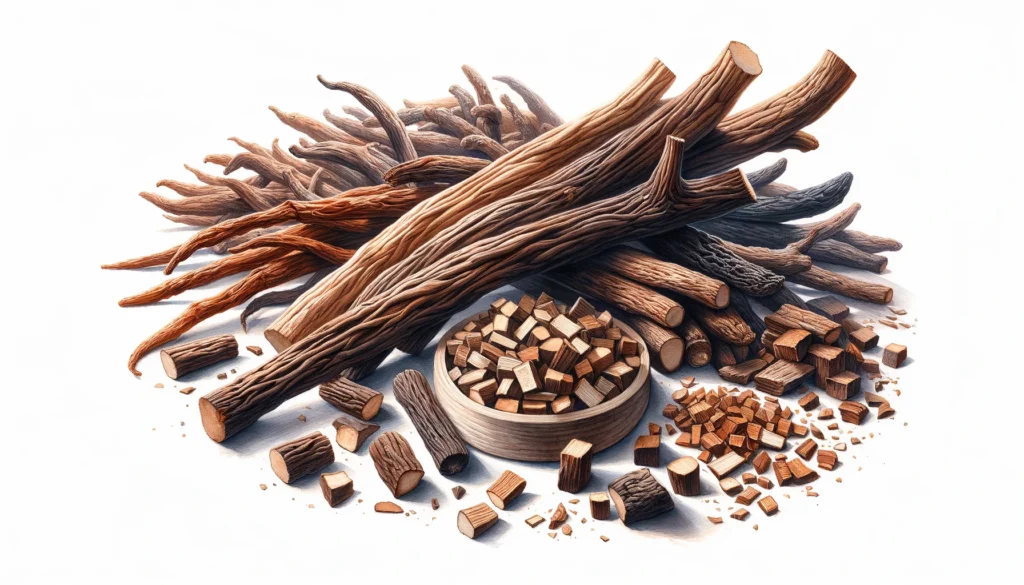If you’re struggling with a sore throat, you know just how uncomfortable and irritating it can be. Luckily, there are natural options that may help alleviate the discomfort and promote healing. One such modality is herbal teas, which have been used for centuries for their soothing and other properties.
According to studies published in reputable medical journals, a number of herbal teas have been found to have antibacterial properties and can help reduce inflammation in the throat.
So, which teas are the best for a sore throat? Let’s explore some of the top options:
- Licorice Tea: Licorice root contains compounds that possess antibacterial and anti-inflammatory effects. Studies have shown that licorice extracts can help reduce throat pain and inflammation, making it an excellent choice for sore throat relief.
- Ginger Tea: Ginger extracts have been shown to possess antioxidant and anti-inflammatory properties. This warming and soothing tea can provide comfort and relief from throat pain and discomfort.
- Echinacea Tea: Echinacea extracts have been found to possess antibacterial and anti-inflammatory properties. This herbal remedy can help reduce inflammation in the throat and combat bacterial infections.
- Sage Tea: Sage extracts contain compounds that exhibit antioxidant and antimicrobial activities. This can help reduce inflammation and fight against bacterial infections in the throat, providing soothing relief.
When searching for the best tea for a sore throat, be sure to choose herbal varieties that are specifically formulated for throat ailments. These teas are often crafted with the perfect blend of ingredients to provide maximum soothing relief for your sore throat.
Remember, while tea can help alleviate the symptoms of a sore throat, it’s always advisable to consult a healthcare professional if your symptoms persist or worsen.
Benefits of Licorice Tea for Sore Throat
Licorice tea is a natural and effective remedy for soothing a sore throat. This herbal tea has been used for centuries due to its healing properties. Licorice root contains compounds that have been found to possess antibacterial and anti-inflammatory effects, making it an ideal choice for relieving throat discomfort.

the demand for medicinal plants, cosmetics, and health products is always on the rise. One such plant from the Leguminosae family is licorice and the scientific name is Glycyrrhiza glabra Linn. It is an herb-type plant with medicinal value. In the following article, we shall elaborately look at the plants’ phytochemical constituents and the pharmacological impact of those substances. Several compounds such as glycyrrhizin, glycyrrhizinic acid, isoliquiritin, and glycyrrhizic acid have been found in this plant, which can provide pharmacological benefit to us with its anti-cancer, anti-atherogenic, anti-diabetic, anti-asthmatic, anti-inflammatory, anti-microbial, and antispasmodic activity. (Hasan 2021)
The compounds present in licorice root help reduce throat pain and inflammation, providing much-needed relief. Additionally, licorice extracts have been found to exhibit antimicrobial activity against Streptococcus pyogenes, the bacteria responsible for causing strep throat.
Compound Molecular Weight (g/mol) Solubility (mg/mL) Glycyrrhizin 821.94 6.86 Glabridin 323.97 7.54 Thymohydroquinone 165.22 2.81 Naringenin 271.26 7.32 Asparegene 131.12 1.63 Liquirtin 417.39 6.34 5-Methoxyhydnocarpin 493.45 6.28 Cynarin 515.46 6.02 Quercetin 301.23 6.12 p-Cymene 133.21 0.82 Generdiol 153.23 3.47 α-Humulene 203.35 2.53 Kaempferol 285.23 6.42
With its natural soothing properties, licorice tea can help alleviate throat irritation and restore comfort. It’s a comforting and enjoyable way to promote throat health and relieve soreness.
The Power of Ginger Tea for Sore Throat
Ginger tea is known for its exceptional properties in soothing and providing relief for a sore throat. The warming sensation of ginger tea can bring comfort and alleviate throat discomfort, making it an ideal choice for those seeking a natural remedy.
Furthermore, research highlights the remarkable antioxidant and anti-inflammatory activities of ginger extracts. These properties not only help alleviate throat pain but also aid in reducing inflammation, providing a comprehensive solution for the discomfort of a sore throat.
Considered a warm beverage for a sore throat, ginger tea has long been recognized for its natural healing properties. Its ability to soothe and alleviate throat pain makes it a popular choice for individuals seeking a comforting tea to relieve throat discomfort.
Ginger (Zingiber officinale) is one of the most widely used natural products consumed as a spice and medicine for treating diabetes, flatulent intestinal colic, indigestion, infertility, inflammation, insomnia, a memory booster, nausea, rheumatism, stomach ache, and urinary tract infections. To date, over 400 bioactive components, such as diarylheptanoids, gingerol analogues, phenylalkanoids, sulfonates, monoterpenoid glycosides, steroids, and terpene compounds have been derived from ginger. Increasing evidence has revealed that ginger possesses a broad range of biological activities, especially protective effects against male infertility, nausea and vomiting, analgesic, anti-diabetic, anti-inflammatory, anti-obesity, and other effects. The pharmacological activities of ginger were mainly attributed to its active phytoconstituents such as 6-gingerol, gingerdiol, gingerol, gingerdione, paradols, shogaols, sesquiterpenes, zingerone, besides other phenolics and flavonoids. (Unofin 2021)
For more on Ginger Tea in relation to its impact on Signalling Pathways check out the nrf2activators blog.
Echinacea Tea for Sore Throat Relief
Echinacea tea is another effective herbal remedy for soothing a sore throat. Echinacea extracts possess antibacterial and anti-inflammatory properties, making Echinacea an ideal choice for reducing inflammation in the throat and fighting off bacterial infections.

Various studies have highlighted the presence of phenolic compounds in Echinacea purpurea, a common variety of Echinacea. These compounds exhibit antioxidant and antimicrobial activities, further enhancing the therapeutic benefits of Echinacea tea for sore throat relief.
| Plant Part | Phytochemical | Molecular Weight (g/mol) | Retention Time (min) |
|---|---|---|---|
| Flowers | Caftaric acid | 311.23 | 2.44 |
| Chlorogenic acid | 353.31 | 2.78 | |
| Caffeic acid | 179.16 | 3.27 | |
| Cynarin | 515.46 | 6.02 | |
| Echinacoside | 785.73 | 6.56 | |
| Cichoric acid | 473.37 | 4.78 | |
| β-Sitosterol | 413.70 | 4.61 | |
| Stems | Quercetin | 301.23 | 6.12 |
| Eugenyl acetate | 205.24 | 8.43 | |
| Leaves | Caftaric acid | 311.23 | 2.44 |
| Cichoric acid | 473.37 | 4.78 | |
| Caffeic acid | 179.16 | 3.27 |
Sage Tea for Sore Throat Soothing
Sage tea is a well-known herbal remedy for soothing a sore throat. Research published in the Journal of Science and Food Agriculture has shown that sage extracts contain phenolic compounds with antioxidant and antimicrobial activities. These compounds can effectively reduce inflammation and fight against bacterial infections in the throat. Sage extracts also contain rosmarinic acid, a natural compound known for its anti-inflammatory properties. This makes sage tea a valuable and natural option for relieving throat discomfort.
Sage compounds have anti-inflammatory, antibacterial, antinociceptive, and astringent properties. Because both plants are traditionally used in the treatment of upper respiratory tract infections and for sore throats, we wanted to see if an herbal treatment could exhibit an efficacy similar to that of synthetic compounds. In this trial, we compared the efficacy of an echinacea/sage throat spray to that of a chlorhexidine/lidocaine spray in the treatment of acute sore throats….
Conclusion
An echinacea/sage preparation is as efficacious and well tolerated as a chlorhexidine/lidocaine spray in the treatment of acute sore throats. (Schapowal 2009)
When experiencing a sore throat, a comforting tea like sage tea can provide much-needed relief. The presence of antioxidant and antimicrobial properties in sage tea plays a crucial role in reducing inflammation and combating bacterial infections in the throat region. \
| Averaged Phytonutrient content of different Sage Teas – (adapted from Walch 2011) | Average (mg/L) |
|---|---|
| Saponarin | 7.8 |
| Luteolin glycosides | 72.4 |
| Rosmarinic acid derivatives | 127.2 |
| Carnosol derivatives | 29.8 |
| ORAC | 36.1 |
| FC index | 9.6 |
With regard to Herbal Teas good for Strep Throat:
Reserchers looked at a dozen herbs good for Strep throat, and found that Licorice Root, Sage an Echinacea came out on top.
We report the inhibitory effect on the growth and biofilm formation of Staphlococcus. pyogenes by phytochemical-rich ethanol extracts derived from selected Canadian traditional medicinal plants, emphasizing their importance as an alternative treatment. We have found that the extracts of sage leaf, purple coneflower flower (Echinacea), and licorice root EEs can significantly reduce the planktonic growth and biofilm formation of S. pyogenes. Potential mechanism of these efficacious four EEs could be due to their impact on cell wall and membrane degradation, which decrease the planktonic growth reducing bacteria population to form the biofilm.
(Wijesundara 2019)


